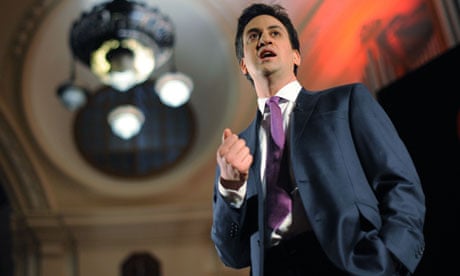Ed Miliband has put the shadow cabinet on guard for an autumn reshuffle with a series of warnings that the party cannot afford any ill-discipline or coasting in the buildup to the 2015 general election.
Sources close to the Labour leader say Miliband is likely to make significant changes to his frontbench team after the autumn party conference in Brighton in September.
Michael Dugher, the party vice-chairman who has Miliband's ear, addressed Labour parliamentary private secretaries last week, telling them they would all be under intense scrutiny from the Tories for the next 18 months to two years. Conservative officials have been scouring opposition MPs' Twitter accounts as they attempt to unearth damaging or embarrassing material about them.
A source said: "The message was that while you might not be household names now, any slip can instantly make you one and do huge damage to the party. The next 18 months is crucial. And the next few weeks are crucial ahead of the June spending review."
With Labour's poll lead showing signs of decreasing in recent weeks, some at the top of the party believe there is also a need for the leadership to "crack the whip" and use the prospect of a reshuffle to ensure loyalty and encourage frontbenchers to make their mark.
"There are too many people in frontbench positions who are invisible," said a source. "We don't know what they do. We want people to be more active as well as disciplined. The prospect of a reshuffle should focus minds right through the summer and conference season."
Some in the shadow cabinet are the subject of whispering campaigns. Stephen Twigg, the shadow education secretary, has been criticised by some of his colleagues for being too timid in his criticism of Michael Gove's school reforms. Twigg still has Miliband's full confidence, however.
It is likely that Miliband will want to promote more women, with Rachel Reeves, the shadow chief secretary to the Treasury, being tipped to shadow a big department when she returns from maternity leave.
Other female MPs who could be preferred include Luciana Berger, Emma Reynolds and former GMTV presenter Gloria De Piero. It emerged recently that a group of women met a Miliband aide to press the case for more female MPs to be considered for broadcasting slots to talk about party policy.
"It is important that the breadth of the party is reflected in the media," Labour MP Meg Hillier said. "It feels like we are seeing fewer women than sometimes in the past. I don't think that's intentional, but we need to hold the feet of the party to the fire and ensure that our women are visible in the media."
Last week, in a move that some Labour MPs said needed to be matched by Miliband, David Cameron answered criticism that he had not done enough to promote young talent on the Tory backbenches when he appointed Jo Johnson, brother of Boris Johnson, the mayor of London, as head of No 10's policy unit. The prime minister also set up a new Conservative policy board, consisting of the veteran MP Peter Lilley and younger MPs, as the party geared up for the next election.
A spokesman for Miliband said that no date had been set for a reshuffle and said that talk of one in late summer or autumn was "pure speculation". Sources insisted that Ed Balls, the shadow chancellor, would be safe in his job until the general election.
In a speech on Saturday in the runup to Thursday's local elections, Cameron aimed his fire at Labour over welfare payments. He said: "What's fair about having a system that pays people to live on benefits when they could seek work? It's not fair. And we are changing it. Welfare was meant to help lift people out of poverty – but in too many cases it trapped them in it. Real help isn't just giving people a cheque – it's giving them a chance."




Comments (…)
Sign in or create your Guardian account to join the discussion